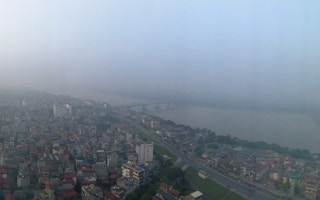An air quality app went out of commission in Vietnam after seriously unhealthy air pollution levels hit capital Hanoi this week.
Switzerland and United States-based air quality monitoring firm IQAir’s AirVisual app went down on 6 October following a series of “abusive and threatening messages” left on the company’s Apple App Store and Google Play Store platforms and its Facebook page, the firm said in a statement today.
Hanoi ranked as the world’s most polluted city on AirVisual this week, when air quality readings rose to “hazardous”, which means that breathing the air in the city can cause serious long-term health problems.
AirVisual’s data is derived from the Vietnam government’s Hanoi Environmental Monitoring Portal and from the United States embassy to report real-time air pollution levels.
“
This is not the first time that revealing the level of air pollution in a city has created fear and led to attacks on the AirVisual community.
IQAir statement
The cause of Hanoi’s recent poor air quality, which is responsible for more deaths in a year than motorbikes, has not been officially confirmed.
Air pollution expert Lauri Myllyvirta, senior analyst, for environmental group Greenpeace’s global air pollution unit, told Eco-Business that, over the past decade, Vietnam has seen coal consumption triple and oil consumption increase by 70 per cent, which he says is the key reason why air quality in the country is worsening. Myllyvirta was behind a major study of air pollution in Jakarta around the Asian Games a year ago.
“Most of the coal-burning power plants and industries in the country are concentrated in the north of the country and affect Hanoi’s air quality,” he said.
Vietnam is adding coal to its energy mix faster than almost any country in the world, to fuel its fast-growing economy.
Severe pollution episodes are caused by a combination of pollution sources—these are the periods when pollution is trapped in the lower atmosphere in a slow-moving air mass, Myllyvirta explained.
“My analysis of the PM2.5 pollution [fine particulate matter that is particularly dangerous to breathe] episode [in Hanoi] during the past week is that the air masses have mainly arrived from the south, from the direction of Nam Dinh, which has a lot of heavy industry, and has also seen agricultural crop burning,” Myllyvirta told Eco-Business.
Industrial and crop-burning emissions from the south have combined with local emissions from transport and household fuel burning to create a toxic smog, he suggested.
Past serious air pollution episodes in Hanoi have been exacerbated by coal-fired power plants mainly in the east of the country.
“To prevent episodes like this from happening in the future, it is crucial to reduce emissions from all these sources,” he said.
IQAir commented: “This is not the first time that revealing the level of air pollution in a city has created fear and led to attacks on the AirVisual community.”
“We are receiving thousands of support messages via Facebook, email, our website and app reviews and this support is essential as we are working with Apple, Google and Facebook to confirm that we have been unfairly attacked and helps us to make the AirVisual apps available again in Vietnam.”
The company said that it was trying to maintain air quality data on Hanoi air quality data via its website.
Update: 9 October. The AirVisual is back up in Vietnam. While the attacks have decreased, they are still ongoing, the company said in a statement.
“Efforts to suppress open and free air pollution data, rather than address the emission sources that have created the problem, are misguided and have negative health and environmental implications,” the firm said.

















